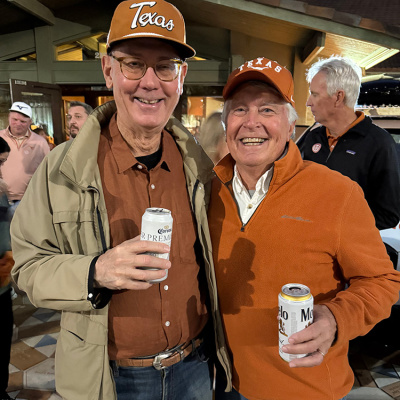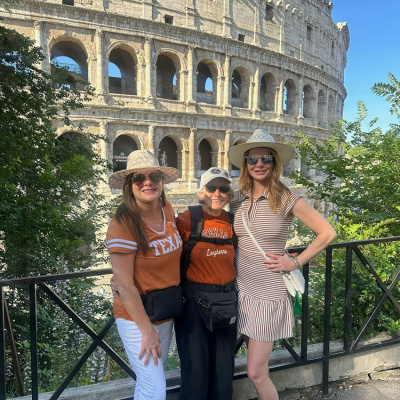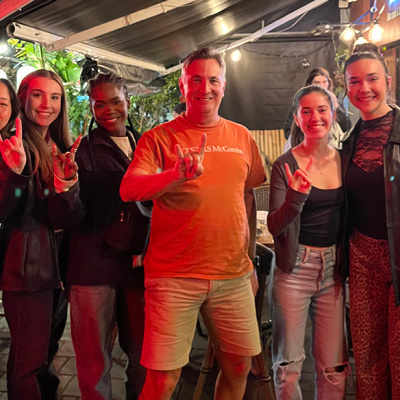Dallas 1963
In 1963, Dallas was simmering with characters who were against the Kennedy presidency. In a new book coinciding with the 50th anniversary of the assassination, two authors dissect the days leading up to that unthinkable tragedy.

Texas’s Democratic national committeeman has a problem with President Kennedy’s upcoming visit to Texas. The issue is Dallas. Byron Skelton can’t shake the feeling that something bad will happen to the president there. It’s more than a sense of foreboding. It feels like a premonition. He suggests to friends that the climate in Dallas could easily inspire an unstable person to take action against Kennedy.
Skelton has been reading news of a recent speech by General Walker that seems to practically invite violence against the president.
Skelton carefully clips out a newspaper story about Walker and includes it with a letter he has decided to send to his best contact in the Kennedy administration, Attorney General Robert Kennedy:
“Frankly, I am worried about President Kennedy’s proposed trip to Dallas. You will note that General Walker says that ‘Kennedy is a liability to the free world.’ A man who would make this kind of statement is capable of doing harm to the President . . . I would feel better if the President’s itinerary did not include Dallas. Please give this your earnest consideration.”
Bobby Kennedy knows Skelton, and he knows that Skelton is not a man given to histrionics. He also understands that showing the letter from Texas to his brother will be a waste of time.

The Kennedy brothers have been hearing all kinds of warnings about Dallas ever since the trip to Texas was first announced. Senator J. William Fulbright of Arkansas has already told the president: “Dallas is a very dangerous place. I wouldn’t go there. Don’t you go.”
Several letters have arrived at the White House pleading for Kennedy to avoid the city.
One Dallas woman has written: “Don’t let the President come down here. I’m worried about him. I think something terrible will happen to him.”
Bobby knows that his brother won’t call off the trip, especially after having to cancel in Chicago. Still, he can’t let Skelton’s letter rest. He decides to pass it along to his brother’s close aide Kenny O’Donnell, the man responsible for the president’s schedule.
O’Donnell reviews the letter. He understands the issue as well as Robert Kennedy does, but there is no stopping Jack Kennedy from going to Dallas. The idea of him shrinking from a confrontation with General Walker is laughable.
In fact, Kennedy has already decided to deliver a hard-hitting speech criticizing political extremists when he visits Dallas.
H. L. Hunt’s chief of security is a former FBI agent, and he enjoys excellent contacts within the Dallas Police Department. He knows that the Dallas police have been monitoring some of the city’s “extremist” groups. Before it’s even filed he knows what’s going into an internal police report on security for Kennedy’s visit.
[pullquote]“Don’t let the President come down here. I’m worried about him. I think something terrible will happen to him.”[/pullquote]
The police have been doing their street-level reconnaissance, trying to figure out if any Dallas local extremists are preparing for violence. The bomb threat against Martin Luther King Jr., the swastikas on Neiman Marcus windows, the cross burning on the Holocaust survivor’s lawn, the Adlai Stevenson riot—they have all added up to a growing folder of information at police headquarters on extremist activists in the city.
The police report is nearly ready, but before it is issued Hunt’s security head sends a memo to Hunt with the details: There are “unconfirmed reports of possible violence during the parade.”
He believes that Hunt will be anxious to avoid any incidents in Dallas—if only because people in Dallas, around the nation, will likely try to blame Hunt for inciting it. He’s been blamed for plenty already: funding Senator Joseph McCarthy, spending millions on his right-wing radio programs, spending more money on distributing the anti-Kennedy screeds that featured the sermons of W. A. Criswell, and even donating cash to General Walker.
Hunt’s security chief has thought it through. He proposes a solution to his reclusive employer: “I have thought about the problem, and I am wondering if a few letters to the editor might not be a good way of pre-exposing this if, in fact, there is a planned incident.”
Hunt is never shy about writing letters to Ted Dealey and the editors at the Dallas Morning News. He’s sent several over the years. And he knows that when a letter from him arrives at Dealey’s newspaper, it carries some freight—the city’s richest man should be allowed space in his local newspaper.

When he receives the private memo from his security chief, Hunt mulls it over. He has extraordinary means at his disposal, a preference for dealing in cash, and a tendency to employ former FBI agents. They are very good, loyal employees, and he pays them very well to keep his predilections private. Hunt finally decides against taking action.
Maybe, just maybe, it would be useful for the president to see how little he is liked in Dallas.
Lee Harvey Oswald’s name has been showing up again in some of the reports that a longtime FBI agent in Dallas is pulling together on extremists in the area. The local FBI first began tracking him and Marina in the summer of 1962, when they arrived from the Soviet Union. The FBI in New Orleans kept tabs on him until there was a sense that he and his wife were both headed back to Texas.
When he returned to Dallas from New Orleans a month ago, he checked into a YMCA. He tried to land a job at a printing company but had no luck. Then he moved from one boardinghouse to another in the Oak Cliff section of the city—not far from the duplex where he had mapped out his assassination attempt on Walker.
Two weeks ago he applied for a laborer’s job at the Texas School Book Depository, and began work the next day. Two days later he turned 24. Two days after that Marina gave birth to Audrey Marina Rachel Oswald.
Things are still not right between him and Marina. Wary as always, she and the babies are living with friends, and he is alone in his boardinghouse in Oak Cliff. A short bus ride takes him right past the Dallas Morning News and Dealey Plaza, not far from Reverend Criswell’s First Baptist Church, and straight to the School Book Depository. On weekends he visits Marina and the girls.
Oswald is anxious to immerse himself back into the political climate in Dallas. He has attended a meeting of the American Civil Liberties Union. He monitored Walker’s U.S. Day rally. And then, just a few days ago, he learned that a local, veteran FBI agent named James Hosty has started making inquiries in the neighborhood where Marina has gone to live with her friend. Hosty sat down with Marina and her friend and talked briefly to them. Marina seemed nervous and he told her she had nothing to fear, that he was not the Gestapo. He asked where Lee lived and Marina’s friend said that she only knew he was somewhere in the Oak Cliff neighborhood.
Later, when Lee talked to Marina, he told her that if the FBI man ever returned, she should get his license plate.
Plenty of people in Dallas say they are one thing when they are really another.

On November 7, Kennedy Press Secretary Pierre Salinger announces that Jacqueline Kennedy will accompany her husband on the upcoming trip to Texas.
This is big news—this is the First Lady’s very first political trip with her husband since his election. She, in fact, has never even been to Texas before. People in the state are delighted, and the state’s newspapers eagerly report the news.
Lady Bird Johnson writes to Jackie from the LBJ Ranch: “The President’s on page five, Lyndon’s on the back page, but you’re on the front page.”
When FBI Agent Hosty returns to his office on November 8, the receptionist hands him a business envelope that is blank on the outside. Inside is a folded, handwritten note on bond paper. It is a short note, no longer than two paragraphs.
Hosty studies the letter. He has gotten these kinds of messages, these complaints, before. This one pretty much reads like many of the others: You’ve been interviewing people I know, my wife, without my permission. You should stop. If you don’t stop talking to my wife, I’ll take action against the FBI.
He notes that the letter is unsigned. Maybe it’s that Jew-hating Jimmy Robinson, the man who had protested Dr. King’s visit to Dallas—and then burned a cross on a Holocaust survivor’s lawn. Hosty was out interviewing Robinson’s wife over the summer.
He puts the letter down and does not share it with anyone else.
The Secret Service arrives in Dallas on November 16 to coordinate security for the president’s visit. Agents are meeting with Dallas police and the local FBI to review the situation. The Secret Service has only five permanent employees in the city, so it will need to rely on local law enforcement to protect the president.
Kennedy wants a motorcade through Dallas. The plan calls for Air Force One to land at Love Field at 11:30 a.m. on the twenty-second. From there, the presidential motorcade will travel through downtown. Immediately after, Kennedy will attend a luncheon and deliver a speech before twenty-five hundred people.
Civic leaders are insisting to the White House that they have the luncheon at the city’s showplace facility—the Trade Mart. The building, however, is a security nightmare. Four stories high with a million square feet, the Trade Mart is arranged around a giant indoor courtyard—and this large open area is the proposed site for the luncheon. Numerous balconies overlook the courtyard, and the building contains a maze of corridors and rooms where an assassin can lurk. Even worse, there are fourteen separate entrances to the courtyard, each of which must be heavily guarded.
The Secret Service grudgingly agrees to accept the site, but everyone realizes it will require intense planning and numerous officers. Inside the White House, Kennedy’s aides know that Dallas poses a unique security challenge—and not just because of the location for the president’s luncheon.
Pushing deadlines, the various agencies try to create a working portfolio of political extremists in the city. FBI Agent James Hosty does not mention that a communist and former defector, Lee Harvey Oswald, is also in Dallas—and that he has just obtained a job along Kennedy’s prospective motorcade route. There is nothing, after all, in Oswald’s past, as far as the FBI is aware, to suggest a propensity for violence. He seems merely quirky, a self-absorbed ideologue. The guy can barely keep a job, let alone a marriage.
Security preparations focus on the places where Kennedy will spend the most time: Love Field and the Trade Mart. At those sites, protection will be exceptionally tight. The Secret Service and Dallas police have reviewed film footage of the Adlai Stevenson protests, and they have made still photos of key Dallas demonstrators to distribute among police officers in charge of access at the airport and the luncheon.
The security for the motorcade is a different matter. During these events, the presidential motorcades generally proceed at twenty miles per hour, though they are often forced to slow down considerably in thick crowds. The president will pass in front of hundreds of buildings and below thousands and thousands of windows. There simply is no way to inspect every single building along the motorcade route, despite what the Dallas Morning News reported.
The security team drives along the prospective course. As the car makes its way through downtown, a Secret Service agent looks up at the skyscrapers surrounding them. He turns to one of the other members of the security detail and says:
“Hell, we’d be sitting ducks.”
From the book DALLAS 1963. Copyright (c) 2013 by Bill Minutaglio, a UT journalism professor, and Steven L. Davis. Reprinted by permission of Twelve/Hachette Book Group, New York, NY. All rights reserved.
Photo credits from top: JFK Collection/ZUMApress.com; Sixth Floor Museum at Dealey Plaza; Clint Grant, Dallas Public Library, Texas/Dallas History and Archives Division.






